Written by Lucie Villeneuve, nutritionist, M.Sc.
This post contains affiliate links from which I may receive a small commission, at no extra cost to you. In no way does this affect my opinion or the information I provide on the product. Please read my disclaimer for more info.
We all know what calorie counting looks like, and often it isn’t fun. So what if I told you it was actually better to stop calorie counting to lose weight?
A calorie is a unit of measurement that measures the amount of energy a food can give you. What we eat gets turned into fuel to make our bodies function, so calories are very important. Yet calories are demonized by diet culture so we track them obsessively and always look for ways to eat less of them.
But is this really the way to go?
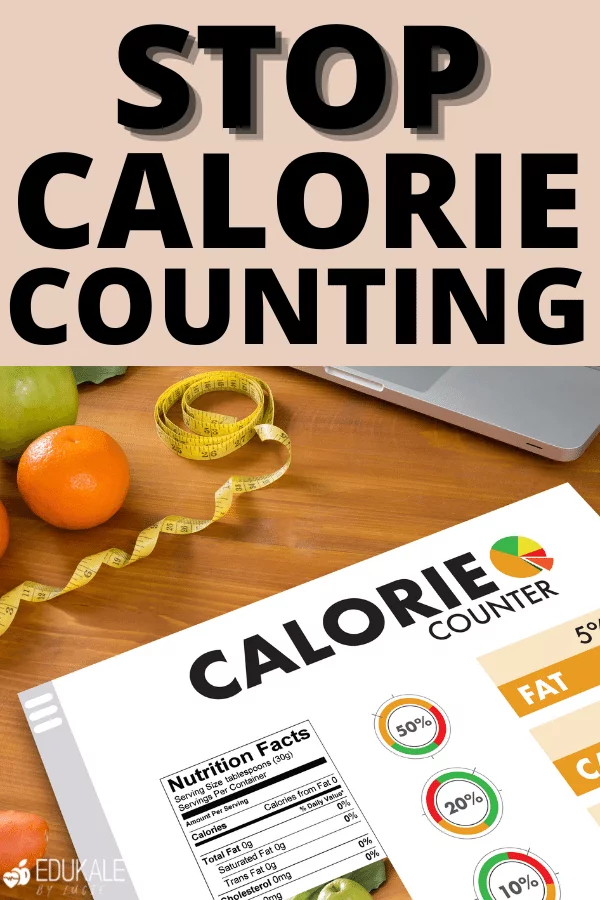
Are there benefits to counting calories?
Although things aren’t as simple as calories in and calories out, the amount of calories you consume obviously plays a role in weight gain and weight loss. If you eat more calories than you burn, you will store them as fat, and if you don’t eat enough calories for your needs, you’ll most likely lose weight.
Again, the process is actually more complicated than this (one example here [1]) and revolves around many different factors. These are just some general notions. Before I get into why I don’t recommend strict calorie counting for most people, I want to take a moment to acknowledge that calorie counting can still be useful in some cases.
First of all, if your lifestyle or job requires you to maintain a specific weight that would be difficult to achieve naturally, calorie counting might be necessary. In this case, this article is probably not for you.
Second of all, if you have absolutely no notion of calories, if you’ve never looked at a serving size or macronutrients, I still think it’s important to have some general knowledge about the calories you consume and the number of calories in each food. So this article isn’t for you YET— check out my healthy eating for beginners article and come back!
Now with all of that being said, I honestly don’t think that calorie counting is a good idea for most people. Now that we’ve gotten the basics out of the way, and that we’ve established that you’re neither a bodybuilder nor a person with zero knowledge on nutrition, let’s get into why you should stop counting calories to lose weight.
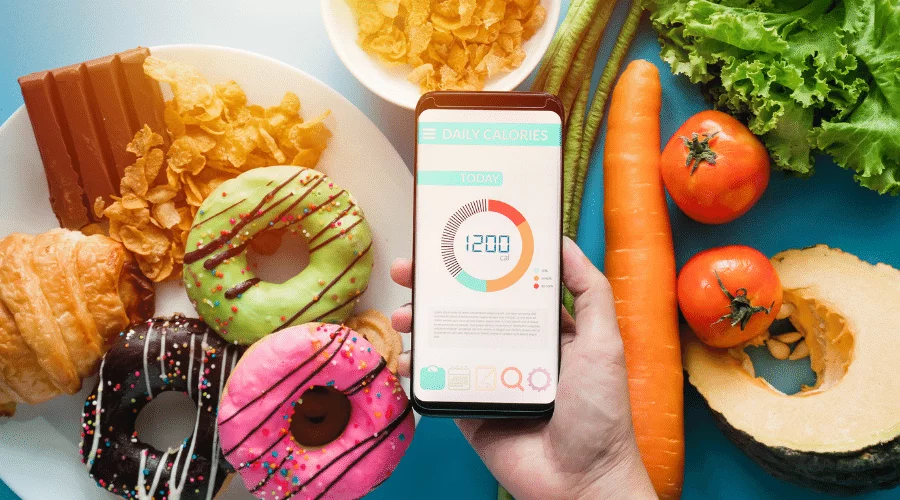
Why you need to stop counting calories to lose weight
It isn’t realistic or practical
If you’re at home with your measuring cups and scales and food items you know by heart, then tracking calories isn’t that hard. But will you really be able to put up with it forever? And what about if you’re eating at a restaurant, at a friend’s house, or ordering take-out? Calories are much harder to track then, and it may even cause you to avoid these situations (which is a shame!).
Also, calories on labels aren’t always accurate: there’s a 20% error margin that’s tolerated between the calories or nutrient values written on the label and the actual calories and values of the food [2].
This doesn’t mean that you need to disregard labels completely, just that you need to be aware that there can be quite a lot of discrepancies, so even if you were to track everything obsessively, you would still be off. So maybe it would be better to focus that energy elsewhere?
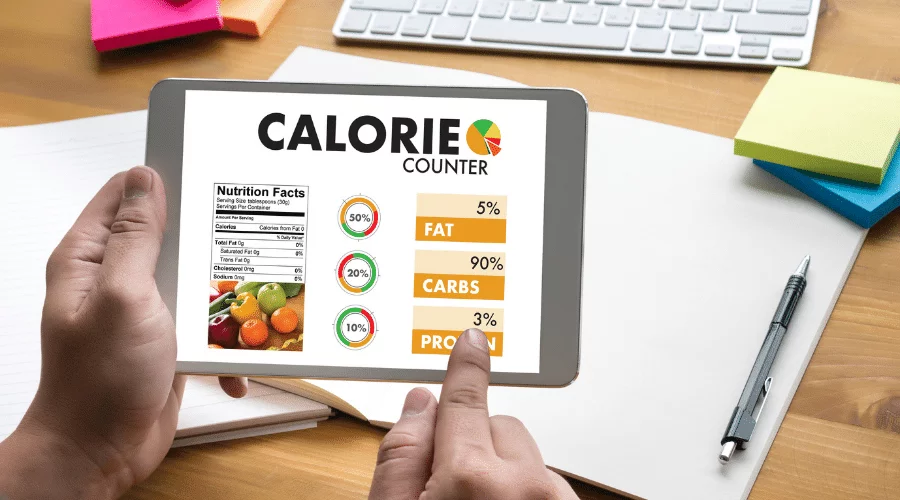
It fuels diet culture and fearing foods
When you count calories, it’s very easy to fall into more unhealthy diet culture patterns. You can start fearing certain foods when you find out that they have a lot of calories, so you will restrict them. This will lead to craving them even more, and you’ll likely end up bingeing on them.
After that, you’ll feed food guilt because you “weren’t supposed to eat these foods”, and end up skipping meals to compensate, or going on detoxes, or punishing yourself with overexercise, etc. You’ll start to feel totally anxious and out of control around food, and you’ll resort to even more rigid calorie tracking to counter that, and the cycle goes on.
It overrides your natural hunger cues
Your body is very good at giving you signals on what and how much it needs to eat— or at least it used to be very good before diet culture had you override all of these signals. When you base your food intake on calories, you’re not letting your body have the chance to tell you how much it actually needs, because you’re completely overlooking your natural hunger and fullness signals. The more you calorie count, the further you move away from these natural cues and from mindful eating.
It reduces food, nutrients, and the pleasure of eating to numbers and calculations
A food is so much more than its calories. First of all, calories tell you nothing about the nutritional value of food items.
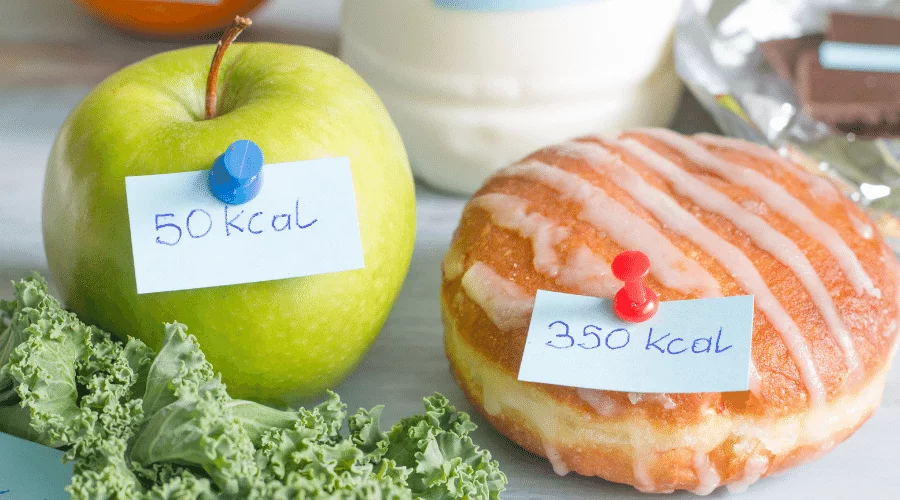
Obviously, 500 calories from a donut or from a fruit and nut salad are vastly different, and counting calories can encourage you to base your food choices solely on calories instead of nutrients and whether or not you actually like the food. This can definitely take the pleasure out of eating, and food isn’t just there for nutrition. It’s also social, cultural, emotional…Don’t reduce it to numbers!
So now that we’ve established that you shouldn’t be counting calories, here’s what to do instead.
What to do instead of counting calories
Focus on creating healthy and balanced meals
Healthy eating means eating a wide variety of foods that give you all the nutrients you need to thrive. Eating a healthy diet doesn’t mean setting a ton of restrictions, having salads all day, banning all the foods you love, and being thin at all costs. It’s about eating balanced and varied meals that you enjoy, fueling your body the right way, and feeling happy and energized.
Make sure that your meals include:
- All the fruit and vegetables
- Whole grains such as brown rice, whole wheat pasta, oats…
- Healthy protein such as legumes, quinoa, tofu…
- Healthy fats like nuts and seeds
Make sure to check out my article on how to create a healthy plate as well!

Turn to more mindful and intuitive eating
Intuitive eating focuses on your body’s internal hunger and fullness cues instead of outside rules and restrictions to meet your needs, and aims to improve your relationship with food. It involves many principles, such as honoring your hunger and fullness cues, making peace with food, respecting your body, and putting your health first.
One important aspect of intuitive eating is to eat mindfully. It means being aware of what you eat, and eating consciously in a healthy and balanced way in order to rediscover taste, flavor, and pleasure. The goal is to listen to what your body needs and to know when you are hungry and when you are full.
Mindful eating means eating slowly, taking the time to chew, and noticing the different textures and flavors of your food. Eating should be done without any distractions, focused on appreciating your food.
Here are some articles I wrote on mindful and intuitive eating.
Heal your relationship with food
Finally, developing a healthy relationship with food is of utmost importance. Society tends to push us towards diet culture and losing weight at all costs, hence the calorie counting, instead of creating healthy and sustainable food habits.
It’s important to let go of your restrictions and regulations regarding food, and to give yourself permission to eat the foods that you like. This doesn’t mean that you should have all of your favorite comfort foods all the time, but that you can incorporate them into your diet in moderation.
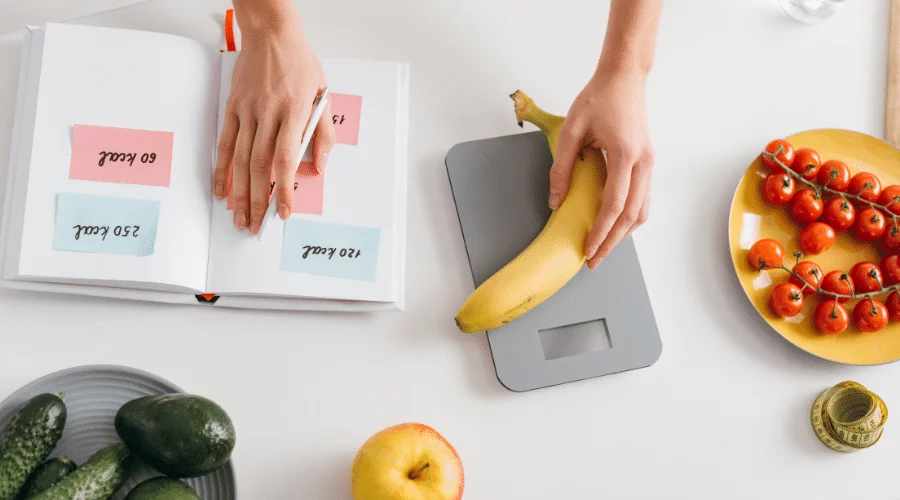
You can have a slice of pizza with a side salad, enjoy a donut after a lentil soup, dip some potato chips along with some carrots in hummus… Working on facing your fear foods can be a part of letting go of this restriction around food.
Learning to listen to your hunger and fullness cues instead of abiding by diet culture laws is also a step in the right direction. Food needs to be seen as a fun and enjoyable way to fuel your body: not something to obsess over nor something to brush off as unimportant.
There are a lot of steps to healing your relationship with food— check out some of my articles on that here.
In short
Calorie counting isn’t practical, fuels diet culture, leads to ignoring your natural hunger cues, and reduces food and meals to numbers. Instead, it’s better to focus on creating healthy and balanced meals, to turn to more mindful and intuitive eating, and to try healing your relationship with food.
-Lucie
If you’re interested in nutrition, its impact on our health, and the science behind it, you should definitely read How Not to Die. In this book, Doctor Michael Greger, founder of Nutrition Facts, examines the top causes of death in America and explains how your diet can prevent— and in some cases even reverse— them. His advice is all backed by science and he writes in a very clear and entertaining way. This book isn’t a list of what you already know. It will teach you the keys to living a long healthy life, in a simple and practical way, and without spending fortunes on supplements and pills!
PLUS if you want to take it a step further, you can check out the How Not to Die Cookbook to implement the advice easily!


